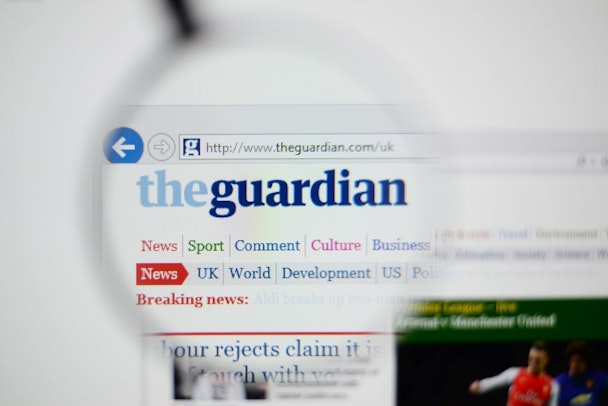The Guardian is suing adtech outfit Rubicon Project for breach of contract
The Guardian has started legal proceedings against adtech firm Rubicon Project after it allegedly failed to disclose fees earned from advertisers that appeared on the publisher’s site.

The Guardian is suing an adtech outfit.
The media owner confirmed today (28 March) that it had “commenced proceedings against Rubicon Project for the recovery of non-disclosed buyer fees in relation of Guardian inventory”. It declined to share any more detail on the move, citing legal reasons.
Rubicon disputed the allegations, arguing that the Guardian’s allegation “amount to a contract dispute, which we will vigorously contest in court”. The “aggregate fees we charge represent the value for our services and are in line with industry practice,” the business said in a statement, before assuring “We split our fees between sellers and buyers, reflecting the value we provide to both.”
“We charge buyer fees for certain services we provide and have disclosed that fact publicly, including in our SEC filings, and in client contracts, including a contract we signed with Guardian over a year ago,” it continued.
“Our marketplace fees on transactions support the considerable and compounding costs of performing an open auction – including our extensive brand protection and inventory quality screening, and malware protection. As we add new buyers and sellers onto the platform, the resulting impact is compounding infrastructure costs. Without buyer fees we would need to charge sellers more, and we think our approach is fair.”
It comes just months after the Guardian’s chief revenue officer Hamish Nicklin revealed that adtech outfits operating within the supply chain are taking up to 70% of advertisers’ money without being able to prove the value they provide. Nicklin's accusations, as reported by Mediatel, were based on his own investigation into where programmatic ad spend goes, which in the worst cases ends up being as little as 30p to the Guardian for every £1 spent by advertisers. At the time, the media executive hinted that he knew where the rest of the money was going but declined to say more, suggesting he needed more proof.
His insistence on greater transparency has been given fresh impetus amid revelations of ad misplacement on YouTube. At Advertising Week Europe, Nicklin was one of the more vocal critics of the current state of the online system, an inevitable perspective given how much money his business stands to lose should things continue as they are. Indeed, an IAB study from 2015 revealed that less than half (45%) of programmatic revenues in the US reached publishers, while adtech firms gobbled up the rest.
“We need full transparency over the whole street,” he continued. “If we are only seeing 30p to the £1, we must be seeing more nefarious practices that go beyond the contract. It can't just be contract transparency but the ability to say, open your books, let us have full audit rights on every single penny that goes from the advertiser to the publisher. Until you get audit rights you are never going to clean this up.”
Supply-side platforms like Rubicon Project have long been viewed as a crucial cog in the larger digital ecosystem, allowing publishers to manage the sale of their ads in automated auctions to secure the highest price for their ads. However, some observers question how valuable that role will be in a marketplace where many publishers are able to access that demand directly.
Until recently, the knee jerk response from publishers to the prospect of smaller revenues has been to introduce more ads on pages. But commercial executives at the likes of the Guardian are increasingly making a more compelling offer to advertisers, eshewing open marketplaces that would normally dilute the value of that inventory in favour of working with advertisers in safer, private alternatives.
"What we get to is this world where the only thing that matters is firing out as many ads as you possibly can to a particular target audience at scale and as cheaply as possible," said Nicklin at Advertising Week Europe.
“That has been the prevailing wisdom of what digital paradigms should be, regardless of what your marketing objectives are. That only ever falls straight in to the hands of Google and Facebook – they are the ones that have scale, they are the ones who understand audience. What they don’t have is quality, premium, safe environments. Those are metrics and factors that are completely ignored in today’s ecosystem – it is all about cheap low cost audiences at scale because it benefits the two people who can shout very loudly about that being the way forward.”

